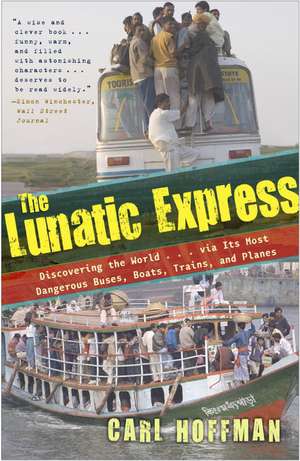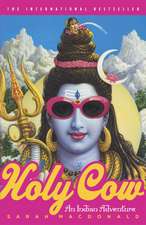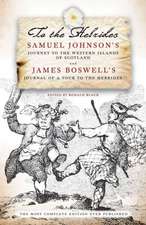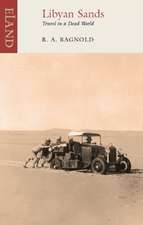The Lunatic Express: Discovering the World... Via Its Most Dangerous Buses, Boats, Trains, and Planes
Autor Carl Hoffmanen Limba Engleză Paperback – 30 iun 2011
The Lunatic Express is the story of traveling with seatmates and deckmates who have left home without American Express cards on conveyances that don't take Visa, and seldom take you anywhere you'd want to go. But it's also the story of traveling as it used to be -- a sometimes harrowing trial, of finding adventure in a modern, rapidly urbanizing world and the generosity of poor strangers, from ear cleaners to urban bus drivers to itinerant roughnecks, who make up most of the world's population. More than just an adventure story, The Lunatic Express is a funny, harrowing and insightful look at the world as it is, a planet full of hundreds of millions of people, mostly poor, on the move and seeking their fortunes.
From the Hardcover edition.
Preț: 107.05 lei
Nou
Puncte Express: 161
Preț estimativ în valută:
20.48€ • 21.39$ • 16.95£
20.48€ • 21.39$ • 16.95£
Carte disponibilă
Livrare economică 14-28 martie
Preluare comenzi: 021 569.72.76
Specificații
ISBN-13: 9780767929813
ISBN-10: 0767929810
Pagini: 286
Ilustrații: maps
Dimensiuni: 134 x 203 x 18 mm
Greutate: 0.24 kg
Editura: BROADWAY BOOKS
ISBN-10: 0767929810
Pagini: 286
Ilustrații: maps
Dimensiuni: 134 x 203 x 18 mm
Greutate: 0.24 kg
Editura: BROADWAY BOOKS
Notă biografică
Carl Hoffman has driven the Baja 1000, ridden reindeer in Siberia, sailed an open dinghy 250 miles, and traveled to 65 countries. When he's able to stay put for more than a few months at a time, he lives in Washington, D.C., where his three children make fun of him on a pretty constant basis. He is a contributing editor at National Geographic Traveler and Wired magazines, and his stories about travel and technology also appear in Outside, National Geographic Adventure, Men's Journal and Popular Mechanics.
From the Hardcover edition.
From the Hardcover edition.
Extras
Mumbai: The city’s cattle class train commute has put a big question
mark over the future of a brilliant sixteen-year-old girl. Raushan
Jawwad, who scored over 92 percent in her class X examination a
few months ago, lost both legs after being pushed out of a crowded
local train near Andheri on Tuesday.
—Times of India, October 17, 2008
Seven
The 290th Victim
“Everything in that book is true,” said Nasirbhai. It was almost
100 degrees, the humidity of the Bay of Bengal pressing
down, and he was wearing a white dress shirt over a sleeveless
undershirt, pleated black slacks, and black oxford shoes. Small
scars were etched around brown eyes that studied me from a
wide, inscrutable face; a big stone of lapis studded one finger,
and a silver bracelet dangled from his wrist. He had a barrel
chest and his hands hung at his sides, ready, waiting— never in
his pockets. He looked immovable, like a pitbull, like a character
from another time and place, and in a way he was. “That
book” was Shantaram, the international best-selling novel written
by Australian Gregory David Roberts, who’d escaped from
prison in Oz and found his way to Bombay two decades ago,
where he’d become deeply involved with its criminal gangs and
Nasir— who always carried the honorific bhai, “uncle.”
“We met in the 1980s,” Nasirbhai said, standing on a corner
in Colaba, one of Mumbai’s oldest neighborhoods and its tourist
epicenter, the streets lined with vendors selling tobacco and sandals
and newspapers and bangles, pedestrians as thick on the
sidewalks as attendees at a rock concert. Roberts was famous
now, a Mumbai legend, and through a friend of a friend had
connected me to Nasirbhai, who agreed to take me deep onto
the commuter trains of the most crowded city on earth, where
the day’s simple commute was a matter of life and death. “Traveling
on these trains is very risky because they are so full,” Nasirbhai
said. “But people must be at work, they must not be late
or their boss will fire them. They must get to their destination, so
they lean out of the doors, hang on to the windows, climb on top
of the train. They risk their life to get to work every day.”
By population, the city— just nineteen miles across, with 19
million souls— was bigger than 173 countries. The population
density of America was thirty-one people per square kilometer;
Singapore 2,535 and Bombay island 17,550; some neighborhoods
had nearly one million people per square kilometer. A
never-ending stream of Indians was migrating to Mumbai,
which was swelling, groaning, barely able to keep pace. In 1990
an average of 3,408 people were packing a nine-car train; ten
years later that number had grown to more than 4,500. Seven
million people a day rode the trains, fourteen times the whole
population of Washington, D.C. But it was the death rate that
shocked the most; Nasirbhai was no exaggerating alarmist. In
April 2008 Mumbai’s Central and Western railway released the
official numbers: 20,706 Mumbaikers killed on the trains in the
last five years. They were the most dangerous conveyances on
earth.
Copyright (c) 2010 by Carl Hoffman.
From the Hardcover edition.
mark over the future of a brilliant sixteen-year-old girl. Raushan
Jawwad, who scored over 92 percent in her class X examination a
few months ago, lost both legs after being pushed out of a crowded
local train near Andheri on Tuesday.
—Times of India, October 17, 2008
Seven
The 290th Victim
“Everything in that book is true,” said Nasirbhai. It was almost
100 degrees, the humidity of the Bay of Bengal pressing
down, and he was wearing a white dress shirt over a sleeveless
undershirt, pleated black slacks, and black oxford shoes. Small
scars were etched around brown eyes that studied me from a
wide, inscrutable face; a big stone of lapis studded one finger,
and a silver bracelet dangled from his wrist. He had a barrel
chest and his hands hung at his sides, ready, waiting— never in
his pockets. He looked immovable, like a pitbull, like a character
from another time and place, and in a way he was. “That
book” was Shantaram, the international best-selling novel written
by Australian Gregory David Roberts, who’d escaped from
prison in Oz and found his way to Bombay two decades ago,
where he’d become deeply involved with its criminal gangs and
Nasir— who always carried the honorific bhai, “uncle.”
“We met in the 1980s,” Nasirbhai said, standing on a corner
in Colaba, one of Mumbai’s oldest neighborhoods and its tourist
epicenter, the streets lined with vendors selling tobacco and sandals
and newspapers and bangles, pedestrians as thick on the
sidewalks as attendees at a rock concert. Roberts was famous
now, a Mumbai legend, and through a friend of a friend had
connected me to Nasirbhai, who agreed to take me deep onto
the commuter trains of the most crowded city on earth, where
the day’s simple commute was a matter of life and death. “Traveling
on these trains is very risky because they are so full,” Nasirbhai
said. “But people must be at work, they must not be late
or their boss will fire them. They must get to their destination, so
they lean out of the doors, hang on to the windows, climb on top
of the train. They risk their life to get to work every day.”
By population, the city— just nineteen miles across, with 19
million souls— was bigger than 173 countries. The population
density of America was thirty-one people per square kilometer;
Singapore 2,535 and Bombay island 17,550; some neighborhoods
had nearly one million people per square kilometer. A
never-ending stream of Indians was migrating to Mumbai,
which was swelling, groaning, barely able to keep pace. In 1990
an average of 3,408 people were packing a nine-car train; ten
years later that number had grown to more than 4,500. Seven
million people a day rode the trains, fourteen times the whole
population of Washington, D.C. But it was the death rate that
shocked the most; Nasirbhai was no exaggerating alarmist. In
April 2008 Mumbai’s Central and Western railway released the
official numbers: 20,706 Mumbaikers killed on the trains in the
last five years. They were the most dangerous conveyances on
earth.
Copyright (c) 2010 by Carl Hoffman.
From the Hardcover edition.
Recenzii
“This book is fabulous. The lean description, the weave of old and new perspective, the personalities, the real-people wisdom, and that the danger is as real as we don't want to think it is. The Lunatic Express is refreshing, liberating, and a paean to true Travel. Hoffman opened my eyes to the off-the-grid traveler, clearly most of the world, and made me cry. The last pages struck home; the duality of escape and harbor are the blessing and curse of life.” -- Keith Bellows, Editor-in-Chief of National Geographic Traveler
“Reinvented the travel log as the supreme theater of paradox…a search for an unholy grail—something freakish; something dangerous; something authentic… Take this ride.” -Richard Bangs, Producer/Host of the Public Television series, Adventures with Purpose
"There are two possibilities: we move through the world, or the world moves through us. Carl Hoffman's clever, funny, fearsome book does both. It takes us into the frantic fear and pitiless extinctions that punctuate the simple struggle to get from home to anywhere, for so many of the world's people. But it also takes us into the heart of the writer: and that journey, with its beauty and compassion, its conscience and courage, is so thrilling that we hope the ride never ends." -- Gregory David Roberts, author of SHANTARAM
“Carl Hoffman, a courageous and interestingly untroubled man from Washington, D.C., has done a great service by reminding us, in The Lunatic Express, of this abiding truism: that the world’s ordinary traveler is compelled to endure all too much while undertaking the grim necessities of modern movement…Mr. Hoffman spent a fascinating year going around the world precisely as most of the world's plainest people do—not on JetBlue or United or American or Trailways, modes of transport that look positively heavenly by comparison, but in the threadbare conveyances of the planet's billions….He learns along the way a great deal about the habits of the world's peripatetic poor, and he writes about both the process and the people with verve and charity, making this book both extraordinary and extraordinarily valuable….It is a wise and clever book too, funny, warm and filled with astonishing characters. But it also represents an important exercise, casting an Argus-eye on a largely invisible but un-ignorable world. It is thus a book that deserves to be read widely. Perhaps in some airport in a blinding rainstorm in the Midwest, while waiting for yet another infernally delayed American plane.” ߝ Simon Winchester, Wall Street Journal
From the Hardcover edition.
“Reinvented the travel log as the supreme theater of paradox…a search for an unholy grail—something freakish; something dangerous; something authentic… Take this ride.” -Richard Bangs, Producer/Host of the Public Television series, Adventures with Purpose
"There are two possibilities: we move through the world, or the world moves through us. Carl Hoffman's clever, funny, fearsome book does both. It takes us into the frantic fear and pitiless extinctions that punctuate the simple struggle to get from home to anywhere, for so many of the world's people. But it also takes us into the heart of the writer: and that journey, with its beauty and compassion, its conscience and courage, is so thrilling that we hope the ride never ends." -- Gregory David Roberts, author of SHANTARAM
“Carl Hoffman, a courageous and interestingly untroubled man from Washington, D.C., has done a great service by reminding us, in The Lunatic Express, of this abiding truism: that the world’s ordinary traveler is compelled to endure all too much while undertaking the grim necessities of modern movement…Mr. Hoffman spent a fascinating year going around the world precisely as most of the world's plainest people do—not on JetBlue or United or American or Trailways, modes of transport that look positively heavenly by comparison, but in the threadbare conveyances of the planet's billions….He learns along the way a great deal about the habits of the world's peripatetic poor, and he writes about both the process and the people with verve and charity, making this book both extraordinary and extraordinarily valuable….It is a wise and clever book too, funny, warm and filled with astonishing characters. But it also represents an important exercise, casting an Argus-eye on a largely invisible but un-ignorable world. It is thus a book that deserves to be read widely. Perhaps in some airport in a blinding rainstorm in the Midwest, while waiting for yet another infernally delayed American plane.” ߝ Simon Winchester, Wall Street Journal
From the Hardcover edition.












